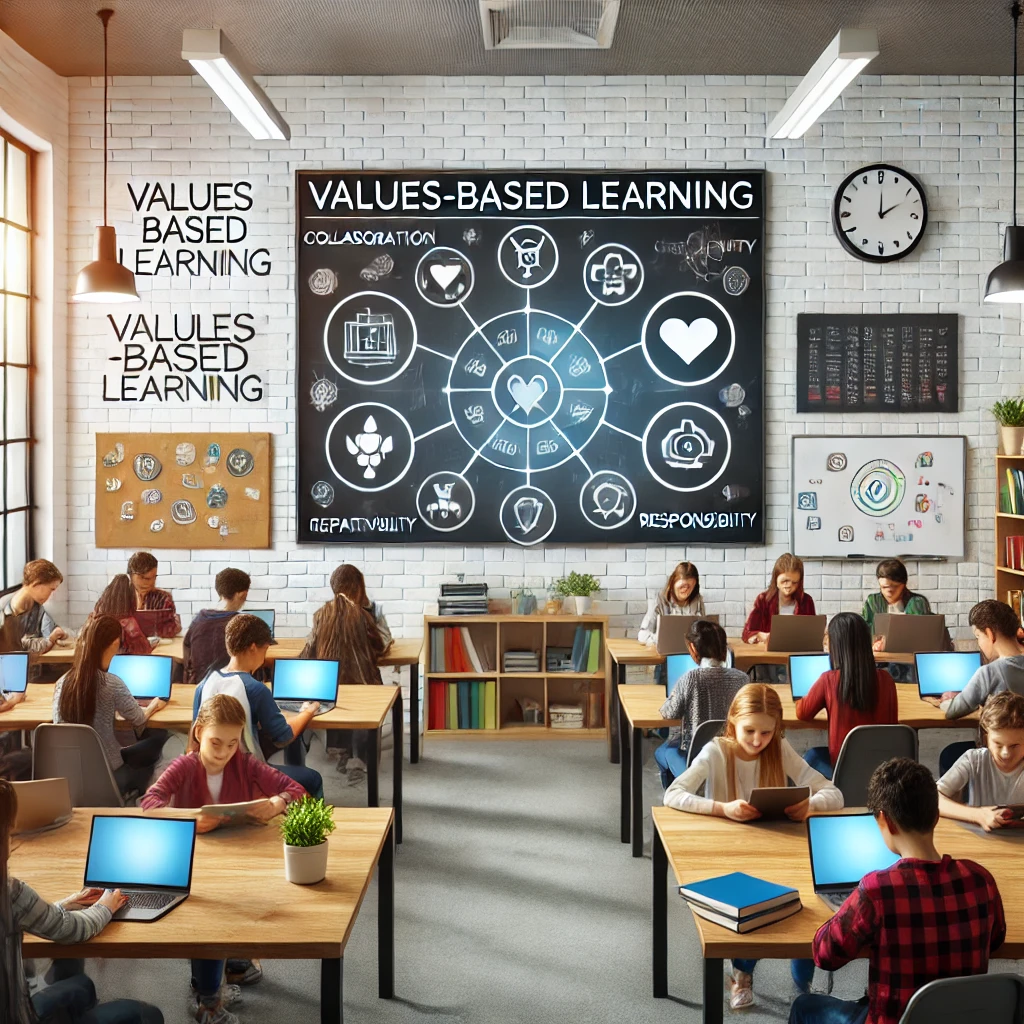by Heba Abduljawad
habduljawad@maqasid.org
In a world marked by unprecedented challenges and rapid changes, education must transcend traditional paradigms to address not only academic achievement but also the ethical and societal crises we face. From environmental degradation to social injustice, the urgency to reshape the values and objectives of our educational systems has never been greater.

This is not just a concern for education experts but a pressing issue for anyone striving to create meaningful societal change. The ongoing situation in Gaza, for instance, starkly contrasts with global calls for urgent environmental action, highlighting the intertwined nature of social and ecological crises. While millions suffer from conflict and injustice, we are reminded that true progress demands a fundamental shift in societal values and cultural mindsets.
Education can move beyond its conventional role, becoming a powerful tool for cultural transformation and sustainable development. By embracing ethical teachings, critical thinking, and the cultivation of curiosity, education can inspire meaningful change in individuals and societies alike.
The Need for Cultural and Societal Change
Recent disasters and crises have proven that no matter how loudly we call for development, our efforts will only make sense if there are changes in how societies think and act. We must promote societies that contribute to achieving a decent, safe, and healthy life, both environmentally and socially. It is not enough to just complain about bad government decisions or go along with them quietly.
The kind of culture we’re talking about here is all about what people believe, what they value, and how they see the world. This culture shapes their actions, practices, and positions, enabling them to distinguish between right and wrong, what corrupts and what reforms, what benefits and what harms. An important factor in shaping these cultures is the education system. Education is supposed to reflect the beliefs and values of society but also help to change them through what students learn.
The Role of Education in Shaping Culture
How can education help make development sustainable? It might sound easy in theory, but it’s hard to do in practice. Although some countries have already started teaching sustainable development in their education systems at the beginning of the twenty-first century and try to integrate core values and ethical teachings into the curriculum, these attempts usually don’t really change the bigger ideas and habits of society. The world continues to suffer from crises and disasters. Addressing these issues needs more than just teaching about the environment, the green economy, and cutting waste in schools. It’s not enough to just get students involved in community projects or by following some protocols set by governments, civil groups, and businesses.
Real change comes from rethinking the values and ideas that education teaches students as they grow up. To tackle social, economic, and psychological problems, we need to rethink how education shapes people’s view of the world, ultimately changing individual and societal life for the better. Education should teach values and ideas and also contribute to the development of skills, concepts, and tools that can be used to reduce or stop unsustainable practices. Are the goals, content, and strategies of our educational systems derived from reference frameworks consistent with our purpose on Earth, as outlined in revelation teachings, which calls us to achieve the essential purpose of our existence on this Earth?
For instance, the Qur’anic principles highlight the responsibilities we have towards the Earth and each other:
إِنِّي جَاعِلٌ فِي الْأَرْضِ (البقرة:30)
(“I will create a successor on Earth”) shows our role as responsibles for maintaining the balance and well-being of our planet.
وَمَنْ أَحْيَاهَا فَكَأَنَّمَا أَحْيَا النَّاسَ جَمِيعًا (المائدة:32)
(“And whoever saves one [life] – it is as if he had saved mankind, all together”) highlights that every human life is sacred and our duty to protect and preserve it.وَلَا تَبْخَسُوا النَّاسَ أَشْيَاءهُمْ (الشعراء:183)
(“And do not deprive people of their due”) and وَلَا تَعْثَوْا فِي الْأَرْضِ مُفْسِدِينَ (البقرة:60)
(“do not commit abuse on Earth, spreading corruption”) stress the importance of justice and preventing abuse and corruption.
These teachings should be integrated into subjects like economics, sociology, and environmental science. Students should learn not only the technical parts of these fields but also the ethical and moral sides for responsible and sustainable practices.
Education has mostly focused on academic achievement, forgetting about students’ feelings, thoughts, and their responsibility to the world. We train generations to increase production, but to what end? Material wealth often increases the gap between rich and poor, creates too much waste, and uses up the Earth’s resources, not solving big problems like poverty and injustice.
The answer lies not just in what we teach, but in how we teach it. We need to inspire students to be more motivated to learn. When students have a desire to know and understand, they’re more likely to use what they learn for good. This matches the Islamic teaching: “Allah will not change the condition of a people until they change what is in themselves” (Qur’an 13:11).
Encouraging students to ask questions is important in education. When they ask deep questions about themselves and the world, they learn to think critically. This approach helps students build new concepts, driving real, lasting change. For example, at the beginning of the academic year, students could be encouraged to ask questions about major global issues and their own roles in addressing them. These questions should be discussed and explored throughout the year, linking their studies to real-world applications and ethical considerations.
Think about how we teach subjects like economics, sociology, biology, and social studies. Are we helping students understand justice, mercy, and responsibility towards the Earth and all mankind? Are we teaching sciences not just technically but also ethically, ensuring that students understand the moral sides of their knowledge and actions? This is very important in the age of technological progress, which brings about complex ethical questions and challenges.
Most of the time, school doesn’t make students really curious about things. Ask any student, “Why are you studying?” and the answer will likely be about getting a good job, not about protecting the environment, making healthy relationships, or managing resources wisely. This disconnect comes because our education system doesn’t make them care about the environment, social responsibility, or sustainable practices.
I’ve been wondering for a long time why education doesn’t change people much. The answer lies in real motivation. Real learning happens when students have a true desire to know and understand. As Allah said, “Allah will not change the condition of a people until they change what is in themselves.” We should encourage people to be curious, to want to learn, and to want to make the future better. This is the foundation for education that truly transforms both individuals and society.
It is difficult for a person to change how they think; they usually copy ideas and beliefs that are closest to their previous views. If they are not curious or do not question their ideas and evaluate the information and facts they hold, the needed change will not happen. That’s why I’ve been interested in making questioning a big part of education to make real changes in people. How can we make the education system, both in school and outside, encourage curiosity and give chances to learn by asking good questions?
Do we let our students start the academic year by asking questions about themselves and the world and then linking these questions to their studies? Do our students ask questions more than we do in the classroom? Are their questions discussed and explored? Questions play a major role in changing concepts and beliefs. They help people learn what’s right and wrong, facts from fake news. Questions are how people really learn and show they want to learn. It removes the distance between the teacher and the learner, promoting deep learning instead of shallow learning.
A person does not learn unless they have internal motivation, and this motivation is created by the teacher in different ways. The culture of questioning also builds an internal discussion with themselves, prompting them to rethink their previous views and build new concepts. The goal is not to ask questions just for discussion or to show off knowledge, but to ask meaningful questions that come from wanting to think, explore, and understand the world. Questions should be honest, aiming to understand and discover the world. They should begin with investigation and documentation, pondering the answers and seeking discovery.
Or, as Dr. Taha Abdel Rahman describes it, the “responsible question”—a question asked with a sense of responsibility towards oneself, society, and the world. It comes from the divine command: “Read in the name of your Lord who created”—a call for knowledge, understanding, and reflection. Such questioning pushes people to do good, adopt correct views and practices that benefit both themselves and society. This is very important with the rise of AI and tools like ChatGPT, where anyone can access large amounts of information. The challenge is in asking the right questions to reach the best answers.
In conclusion, for education to bring about real change in an individual’s views and behavior, it requires a review of the means and methods that create in students the need to have a responsible and effective orientation towards themselves and their society. Educational institutions should adopt plans to move from false concepts of development to those based on principles of reconstructing the Earth (إعمار الأرض), succession (الاستخلاف), mercy, and justice. They should adopt strategies that promote the culture of questioning in education, encouraging students and society to build a generation with both scientific knowledge and the ability to build a better world.

